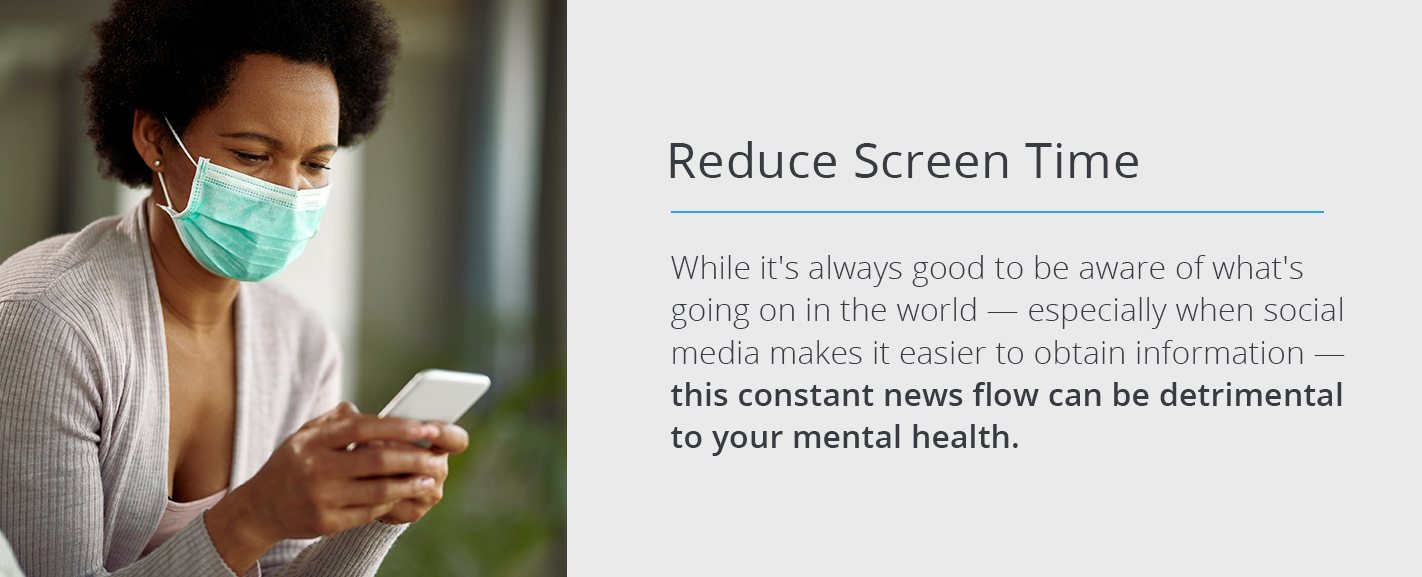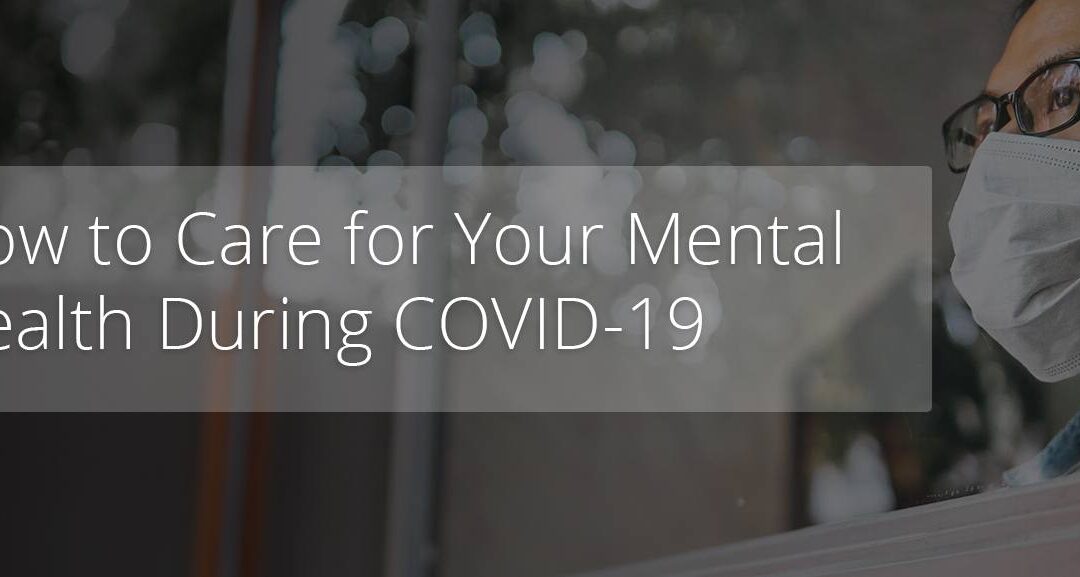For many of us, living through a global pandemic is a brand new reality that we may not know how to deal with. The looming threat of an unseen foe will inevitably affect our mental health, and staying home can add a new layer of physical and psychological issues. The good news is that you’re not alone — we are all in this together, and there isn’t one “right” way to deal with this pandemic. Different strategies will work better for different people — the goal should be to find the ones that help you. Some of us face an added fear of making ends meet thanks to the loss of income, while others live alone and find it difficult to adjust to increased solitude. Our physical health may decline since we’re unable to attend our usual gyms or exercise classes, and reading the news to stay on top of the pandemic could be adding to our overall stress. Declining mental health during COVID-19 is taking a toll on everyone. It’s extremely important to both acknowledge and address how this pandemic affects us — as well as learn healthy coping mechanisms.
Common Mental Health Challenges We Are Facing
Everyone reacts differently to stress, but certain symptoms are more common than others. These include:
- Anxiety: Prolonged and indefinite stay-at-home recommendations, in addition to the fact that health professionals are continuously learning more about the virus, force us to face the magnitude of this global pandemic. This inevitably leads to feelings of anxiety about the unknown future, coupled with the looming threat of infection and its aftermath. However, everyone can take precautions to minimize the likelihood of contracting the virus and minimize anxiety by focusing on things that lie within our control.
- Depression: Anxiety often goes hand in hand with depression. The barrage of news stories about the pandemic, coupled with the task of coping with isolation, can make even the most normal feelings of sadness seem magnified.
- Addiction: Boredom, combined with anxiety or depression, can lead to indulging in unhealthy habits, such as alcohol use, drug use or overeating. If these behaviors are prolonged, these activities can quickly become a serious addiction, which only adds to the stress of coping with mental health during COVID-19.
- Grief: Even if we’re not glued to the news, the rising number of people dying from the novel coronavirus is impossible to escape, and there is newfound grief at this massive loss of life. The grief can be even stronger when someone close to us passes away, either from the virus or other causes, making it impossible to see them before they died or even attend their funeral.
- Illness: People with chronic illnesses or conditions may feel the added pressure of maintaining their physical well-being at a time when accessing health care services is difficult due to an overwhelmed system.
6 Ways of Dealing With Mental Health During COVID-19
Acknowledging the negative impacts on your mental health during COVID-19 is one thing, but finding the right coping mechanisms and ways to alleviate symptoms of depression, anxiety and other mental health challenges is another. It’s also important to remember that while some of these challenges may go away on their own after the pandemic passes, there will likely be side effects that continue to affect your mental health after COVID-19 is under control. Here are six ways to help yourself cope with mental health challenges during COVID-19:
1. Eat a Balanced Diet
Lethargy and apathy are not uncommon when you’re forced to stay at home, especially when you live alone. These feelings can lead to all sorts of bad habits, including an unhealthy diet. Times may be uncertain, and you might be tempted to forgo self-care and choose takeout over healthier foods. To relieve your pandemic anxiety a little more, balance your diet with some immune-boosting foods, such as:
- Red bell peppers: Chock-full of nutrients, red bell peppers also contain 211% of your daily recommended intake of vitamin C.
- Mushrooms: At a time when our outdoor recreation may feel limited, some may not be getting the adequate amount of vitamin D. Luckily, mushrooms are an excellent alternative source of the “sunshine vitamin,” which may help prevent minor respiratory illnesses.
- Spinach: Spinach is great for vitamin A, which is crucial for your immune system to function well.
- Yogurt: Though plain yogurt is the best, any yogurt will provide your body with the probiotics that maintain a healthy gut and immune system. Plus, new studies show that probiotics also help fight respiratory infections.
- Sunflower seeds: If you’re the sort of person who loves snacking, sunflower seeds are a tasty and nutritious snack for you. These seeds are so full of vitamin E that just an ounce of dry-roasted seeds provides 49% of your daily vitamin E requirement.
2. Move Your Body
Maintaining a healthy diet is great, but a proper diet coupled with regular physical activity is proven to improve your mental health and help alleviate symptoms of depression and anxiety. Exercise doesn’t have to be a boring, repetitive activity you do by yourself. One benefit of exercise and physical activity is endorphins, which help mitigate depression and anxiety symptoms. Exercise is also great for overall cardiovascular and lung health, and regular exercise can even alleviate symptoms of respiratory illnesses. Plus, maintaining a reliable sleep schedule is also crucial for improved mental health, and getting a proper night’s sleep is easier when your body and mind are tired after some exercise.
3. Reduce Screen Time

4. Maintain a Routine
We don’t realize it, but having a routine helps us maintain a sense of normalcy even in abnormal times. That is why maintaining a schedule — or even developing a new one — is a great way of coping with anxiety during COVID-19. If you’ve switched to working from home during the pandemic, you may already have a routine in play for your workday. If you don’t, it’s time to create one. Get up and go to sleep around the same time every day, and eat regular meals daily. Allow some designated leisure time to indulge in hobbies or exercise. These pastimes can help your day go by faster and make you feel more accomplished and constructive.
5. Find a Pleasant Distraction
If you have a hobby you’ve neglected, or if you’ve been putting off learning a new skill, now is a good time to pick it up. With extra time on your hands, you can afford to invest some of it into picking up some pleasant distractions. Crafts, exercise and reading are just some of the things you can try, but even binge-watching corny TV shows is a valid distraction. The goal is to do something that will help you relax and unwind, thus helping you in dealing with sadness during COVID-19.
6. Connect With Others
A great thing about modern technology is how easily it can connect you to your loved ones. Whether you talk via text message, social media or video conference, even solitary quarantine doesn’t have to mean cutting contact with your friends or family. If your area is allowing more socialization, take advantage of this opportunity and have socially distanced hangouts with your friends. If you don’t feel comfortable going out just yet, many apps and websites allow you to interact with friends and strangers alike. You can even use these platforms to reach out for psychological help if need be.
Seek Help at Merrimack Valley Psychological Associates in the Andover Area
Recovering your mental health after a global pandemic doesn’t have to be an impossible task, and waiting until this event passes isn’t necessary. With tele-therapy options from Merrimack Valley Psychological Associates, you can start prioritizing your mental and emotional well-being in this unique and uncertain time. Our trained clinicians offer a range of therapies based on our patients’ needs and tackle numerous issues, including stress management and family counseling.
Wondering if therapy is right for you? Our Frequently Asked Questions page can help you learn more before you decide.Get in touch to schedule an appointment by calling 978-482-7351.
Reviewed By
Dr. David Rainen, PsyD.
I am a licensed clinical psychologist with an extensive background treating a variety of different ages, situations, emotional and mental health disorders in individuals and their families. As part of my 10 year professional and training career in psychology, I have developed and refined my skills and approaches through my work in a variety of diverse settings including: hospitals, community outpatient facilities, college counseling centers, secure and unsecure inpatient/residential treatment programs, and therapeutic day schools.



